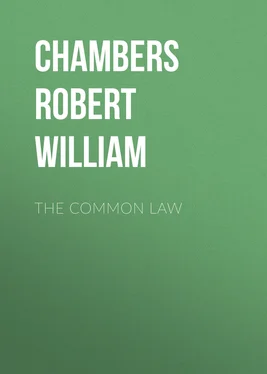Robert Chambers - The Common Law
Здесь есть возможность читать онлайн «Robert Chambers - The Common Law» — ознакомительный отрывок электронной книги совершенно бесплатно, а после прочтения отрывка купить полную версию. В некоторых случаях можно слушать аудио, скачать через торрент в формате fb2 и присутствует краткое содержание. Жанр: foreign_prose, foreign_antique, на английском языке. Описание произведения, (предисловие) а так же отзывы посетителей доступны на портале библиотеки ЛибКат.
- Название:The Common Law
- Автор:
- Жанр:
- Год:неизвестен
- ISBN:нет данных
- Рейтинг книги:4 / 5. Голосов: 1
-
Избранное:Добавить в избранное
- Отзывы:
-
Ваша оценка:
- 80
- 1
- 2
- 3
- 4
- 5
The Common Law: краткое содержание, описание и аннотация
Предлагаем к чтению аннотацию, описание, краткое содержание или предисловие (зависит от того, что написал сам автор книги «The Common Law»). Если вы не нашли необходимую информацию о книге — напишите в комментариях, мы постараемся отыскать её.
The Common Law — читать онлайн ознакомительный отрывок
Ниже представлен текст книги, разбитый по страницам. Система сохранения места последней прочитанной страницы, позволяет с удобством читать онлайн бесплатно книгу «The Common Law», без необходимости каждый раз заново искать на чём Вы остановились. Поставьте закладку, и сможете в любой момент перейти на страницу, на которой закончили чтение.
Интервал:
Закладка:
"Besides—I'm not a bit lonely to-day…. I'm afraid I wouldn't let you, Kel—I mean Louis."
"Why didn't you say 'Kelly'?"
"Kelly is too god-like to kiss."
"Oh! So that's the difference! Kelly isn't human; Louis is."
"Kelly, to me," she admitted, "is practically kissless…. I haven't thought about Louis in that regard."
"Consider the matter thoroughly."
"Do you wish me to?" She bent her head, smiling. Then, looking up with enchanting audacity:
"I really don't know, Mr. Neville. Some day when I'm lonely—and if Louis is at home and Kelly is out—you and I might spend an evening together on a moonlit lake and see how much of a human being Louis can be."
She laughed, watching him under the dark lashes, charming mouth mocking him in every curve.
"Do you think you're likely to be lonely to-night?" he asked, surprised at the slight acceleration of his pulses.
"No, I don't. Besides, you'd be only the great god Kelly to me this evening. Besides that I'm going to dinner with Querida, and afterward we're going to see the 'Joy of the Town' at the Folly Theatre."
"I didn't know," he said, curtly. For a few moments he sat there, looking interestedly at a familiar door-knob. Then rising: "Do you feel all right for posing?"
"Yes."
"Alors—"
"Allons, mon dieu!" she laughed.
Work began. She thought, watching him with sudden and unexpected shyness, that he seemed even more aloof, more preoccupied, more worried, more intent than before. In this new phase the man she had known as a friend was now entirely gone, vanished! Here stood an utter stranger, very human, very determined, very deeply perplexed, very much in earnest. Everything about this man was unknown to her. There seemed to be nothing about him that particularly appealed to her confidence, either; yet the very uncertainty was interesting her now—intensely.
This other phase of his dual personality had been so completely a surprise that, captivated, curious, she could keep neither her gaze from him nor her thoughts. Was it that she was going to miss in him the other charm, lose the delight in his speech, his impersonal and kindly manner, miss the comfortable security she had enjoyed with him, perhaps after some half gay, half sentimental conflict with lesser men?
What was she to expect from this brand-new incarnation of Louis Neville? The delightful indifference, fascinating absent-mindedness and personal neglect of the other phase? Would he be god enough to be less to her, now? Man enough to be more than other men? For a moment she had a little shrinking, a miniature panic lest this man turn too much like other men. But she let her eyes rest on him, and knew he would not. Whatever Protean changes might yet be reserved for her to witness, she came to the conclusion that this man was a man apart, different, and would not disappoint her no matter what he turned into.
She thought to herself: "If I want Kelly to lean on, he'll surely appear, god-like, impersonally nice, and kindly as ever; if I want Louis to torment and provoke and flirt with—a little—a very little—I'm quite sure he'll come, too. Whatever else is contained in Mr. Neville I don't know; but I like him separately and compositely, and I'm happy when I'm with him."
With which healthy conclusion she asked if she might rest, and came around to look at the canvas.
As she had stood in silence for some time, he asked her, a little nervously, what she thought of it.
"Louis—I don't know."
"Is your opinion unfavourable?"
"N-no. I am like that, am I not?"
"In a shadowy way. It will be like you."
"Am I as—interesting?"
"More so," he said.
"Are you going to make me—beautiful?"
"Yes—or cut this canvas into shreds."
"Oh-h!" she exclaimed with a soft intake of breath; "would you have the heart to destroy me after you've made me?"
"I don't know what I'd do, Valerie. I never felt just this way about anything. If I can't paint you—a human, breathing you —with all of you there on the canvas— all of you, soul, mind, and body—all of your beauty, your youth, your sadness, happiness—your errors, your nobility— you , Valerie!—then there's no telling what I'll do."
She said nothing. Presently she resumed the pose and he his painting.
It became very still in the sunny studio.
CHAPTER IV
In that month of June, for the first time in his deliberately active career, Neville experienced a disinclination to paint. And when he realised that it was disinclination, it appalled him. Something—he didn't understand what—had suddenly left him satiated—and with all the uneasiness and discontent of satiation he forced matters until he could force no further.
He had commissions, several, and valuable; and let them lie. For the first time in all his life the blank canvas of an unexecuted commission left him untempted, unresponsive, weary.
He had, also, his portrait of Valerie to continue. He continued it mentally, at intervals; but for several days, now, he had not laid a brush to it.
"It's funny," he said to Querida, going out on the train to his sister's country home one delicious morning—"it's confoundedly odd that I should turn lazy in my old age. Do you think I'm worked out?" He gulped down a sudden throb of fear smilingly.
"Lie fallow," said Querida, gently. "No soil is deep enough to yield without rest."
"Yours does."
"Oh, for me," said Querida, showing his snowy teeth, "I often sicken of my fat sunlight, frying everything to an iridescent omelette." He shrugged, laughed: "I turn lazy for months every year. Try it, my friend. Don't you even keep mi-carême ?"
Neville stared out of the window at the station platform past which they were gliding, and rose with Querida as the train stopped. His sister's touring car was waiting; into it stepped Querida, and he followed; and away they sped over the beautiful rolling country, where handsome cattle tried to behave like genuine Troyon's, and silvery sheep attempted to imitate Mauve, and even the trees, separately or in groups, did their best to look like sections of Rousseau, Diaz, and even Corot—but succeeded only in resembling questionable imitations.
"There's to be quite a week-end party?" inquired Querida.
"I don't know. My sister telephoned me to fill in. I fancy the party is for you."
"For me !" exclaimed Querida with delightful enthusiasm. "That is most charming of Mrs. Collis."
"They'll all think it charming of you. Lord, what a rage you've become and what a furor you've aroused!… And you deserve it," added Neville, coolly.
Querida looked at him, calm intelligence in his dark gaze; and understood the honesty of the comment.
"That," he said, "if you permit the vigour of expression, is damn nice of you, Neville. But you can afford to be generous to other painters."
"Can I?" Neville turned and gazed at Querida, gray eyes clear in their searching inquiry. Then he laughed a little and looked out over the sunny landscape.
Querida's olive cheeks had reddened a trifle.
Neville said: "What is the trouble with my work, anyway? Is it what some of you fellows say?"
Querida did not pretend to misunderstand:
"You're really a great painter, Neville. And you know it. Must you have everything ?"
"Well—I'm going after it."
"Surely—surely. I, also. God knows my work lacks many, many things—"
"But it doesn't lack that one essential which mine lacks. What is it?"
Querida laughed: "I can't explain. For me—your Byzantine canvas—there is in it something not intimate—"
"Austere?"
"Yes—even in those divine and lovely throngs. There is, perhaps, an aloofness—even a self-denial—" He laughed again: "I deny myself nothing—on canvas—even I have the audacity to try to draw as you do!"
Читать дальшеИнтервал:
Закладка:
Похожие книги на «The Common Law»
Представляем Вашему вниманию похожие книги на «The Common Law» списком для выбора. Мы отобрали схожую по названию и смыслу литературу в надежде предоставить читателям больше вариантов отыскать новые, интересные, ещё непрочитанные произведения.
Обсуждение, отзывы о книге «The Common Law» и просто собственные мнения читателей. Оставьте ваши комментарии, напишите, что Вы думаете о произведении, его смысле или главных героях. Укажите что конкретно понравилось, а что нет, и почему Вы так считаете.












